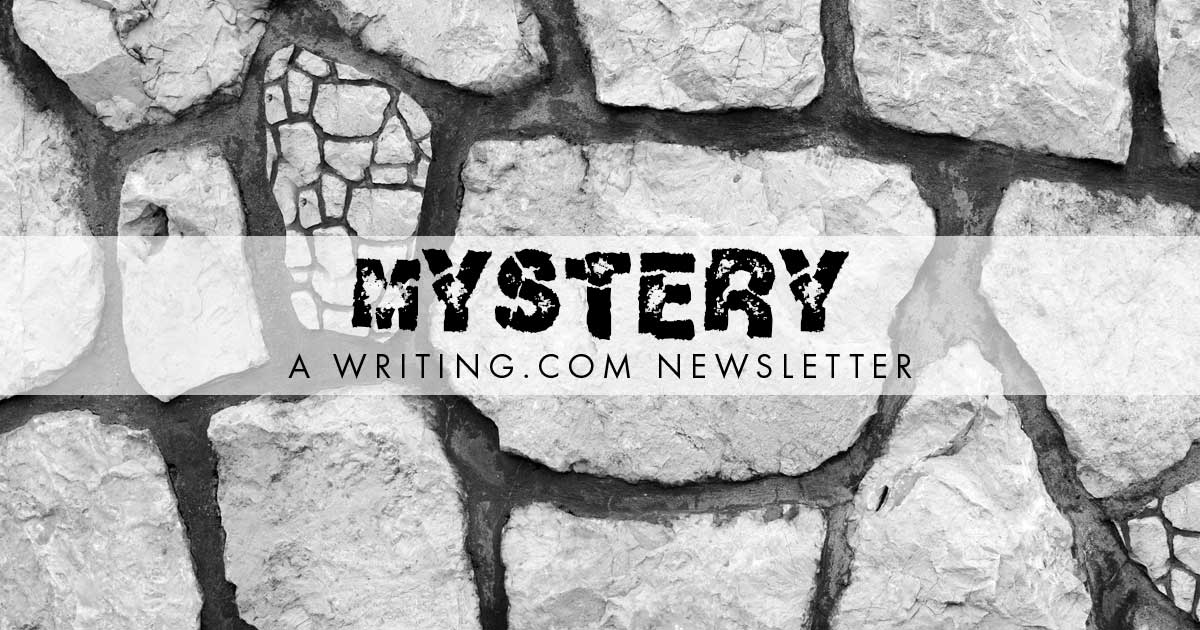This week: Seeing through the lies Edited by: Arakun the twisted raccoon  
More Newsletters By This Editor 
![Table of Contents [#401437]
Table of Contents](https://www.Writing.Com/main/trans.gif) ![Table of Contents [#401437]
Table of Contents Table of Contents](/main/images/action/display/ver/1709303267/item_id/401437.png)
1. About this Newsletter
2. A Word from our Sponsor
3. Letter from the Editor
4. Editor's Picks
5. A Word from Writing.Com
6. Ask & Answer
7. Removal instructions
![About This Newsletter [#401439]
About This Newsletter](https://www.Writing.Com/main/trans.gif) ![About This Newsletter [#401439]
About This Newsletter About This Newsletter](https://www.writing.com/main/images/action/display/ver/1709303676/item_id/401439.png)
Quote for the week:
"Mystery spread its cloak across the sky.
We lost our way.
Shadows fell from trees.
They knew why."
~From "House of Four Doors" by the Moody Blues |
![Word from our sponsor [#401440]
Word from our sponsor](https://www.Writing.Com/main/trans.gif) ![Word from our sponsor [#401440]
Word from our sponsor Word from our sponsor](https://www.writing.com/main/images/action/display/ver/1709303724/item_id/401440.png)
| ASIN: B0CJKJMTPD |
Product Type: Kindle Store
|
Amazon's Price: $ 4.99
|
|
![Letter from the editor [#401442]
Letter from the editor](https://www.Writing.Com/main/trans.gif) ![Letter from the editor [#401442]
Letter from the editor Letter from the editor](https://www.writing.com/main/images/action/display/ver/1709303784/item_id/401442.png)
In mystery stories, as well as real life, people don't always tell the truth. Separating truth from lies is a necessary part of solving mysteries.
There are many reasons why a character might lie. The most obvious reason for a witness or suspect to lie is that they are guilty of the crime themselves. They also might lie to protect someone they love or to pin the crime on someone they hate. Some characters who are innocent of the crime might lie about their whereabouts at the time it happened to cover up some other activity they don't want discovered. Others might simply lie for attention or to feel important.
In 1921, John Augustus Larson, a police officer and forensic scientist, invented a device called a polygraph, also known as a "lie detector." The device does not actually detect lies, but measures physiological responses often associated with lying. These responses include blood pressure, pulse, respiratory rate, and skin conductivity (which changes in response to perspiration.)
While polygraph testing is often used in police investigations in the US, many jurisdictions do not allow the results to be introduced as evidence in court, because it is known to be inaccurate. Scientific bodies such as the National Academy of Sciences and American Psychological Association have stated that there is little evidence that the testing can reliably detect lies. Defendants have the right to refuse a polygraph test, and most defense attorneys will advise their clients not to take it. Even with its inaccuracies, polygraph testing is valuable to police, because some guilty people assume it will reveal that they are lying and will confess when asked to take it.
The device works on the premise that most people will become anxious when they are lying, eliciting a response such as increased heart or respiratory rate. However, physiological reactions to lying are not universal. Some people do not become anxious at all when they lie. Others might suffer severe anxiety just because they are taking a polygraph test. A suspect who is delusional might actually believe that what they are saying is true, even if it only happened in their own mind.
Some interrogators might rely on behavioral cues to determine whether a subject is lying, but these also differ from person to person. In some cultures, lack of eye contact might be a sign of dishonesty. In other cultures, people look down when addressing authority figures as a sign of respect. Some people are so uncomfortable with eye contact that they do not look at anyone when speaking to them. Without knowing the subject really well, it is difficult to determine whether they are lying based on behavioral cues alone. For example, a mother might know immediately if her children are lying, while they might be able to fool someone who didn't know them as well.
The best way to determine whether someone is lying is to find evidence of inaccuracies in their statements. For example, someone might be seen on surveillance video in the area of the crime at a time he said he was somewhere else.
Something to try: Write a mystery story where everyone is lying, including innocent suspects. |
![Editor's Picks [#401445]
Editor's Picks](https://www.Writing.Com/main/trans.gif) ![Editor's Picks [#401445]
Editor's Picks Editor's Picks](https://www.writing.com/main/images/action/display/ver/1709303830/item_id/401445.png)
| | Twenty-nine  (13+) (13+)
There's some things in this world you can't explain. (2142 w) Winner: 2020 Quill Awards.
#2235558 by Nightkeeper   |
|
![Word From Writing.Com [#401447]
Word from Writing.Com](https://www.Writing.Com/main/trans.gif) ![Word From Writing.Com [#401447]
Word from Writing.Com Word from Writing.Com](https://www.writing.com/main/images/action/display/ver/1709303874/item_id/401447.png)
Have an opinion on what you've read here today? Then send the Editor feedback! Find an item that you think would be perfect for showcasing here? Submit it for consideration in the newsletter!
https://www.Writing.Com/go/nl_form
Don't forget to support our sponsor!
| ASIN: B0CJKJMTPD |
Product Type: Kindle Store
|
Amazon's Price: $ 4.99
|
|
![Ask & Answer [#401448]
Ask & Answer](https://www.Writing.Com/main/trans.gif) ![Ask & Answer [#401448]
Ask & Answer Ask & Answer](https://www.writing.com/main/images/action/display/ver/1709303902/item_id/401448.png)
| Question for next time: What subjects would you like to see in future mystery newsletters? |
![Word from our sponsor [#401440]
Word from our sponsor](https://www.Writing.Com/main/trans.gif) ![Word from our sponsor [#401440]
Word from our sponsor Word from our sponsor](https://www.writing.com/main/images/action/display/ver/1709303724/item_id/401440.png)
| ASIN: B000FC0SIM |
Product Type: Kindle Store
|
Amazon's Price: $ 12.99
|
|
![Unsubscribe [#401452]
Removal Instructions](https://www.Writing.Com/main/trans.gif) ![Unsubscribe [#401452]
Removal Instructions Removal Instructions](https://www.writing.com/main/images/action/display/ver/1709303960/item_id/401452.png)
To stop receiving this newsletter, click here for your newsletter subscription list. Simply uncheck the box next to any newsletter(s) you wish to cancel and then click to "Submit Changes". You can edit your subscriptions at any time.
|
